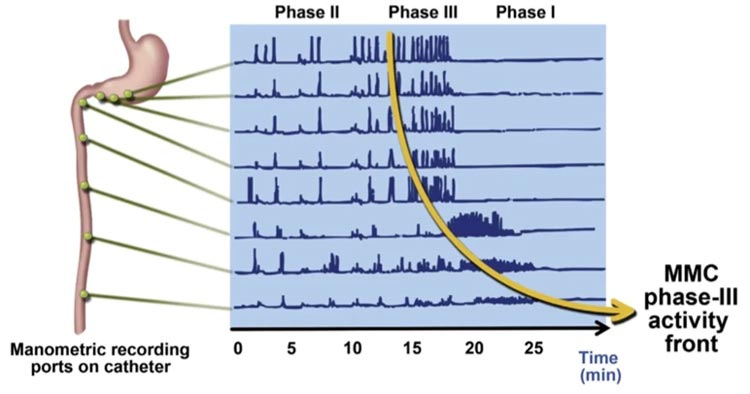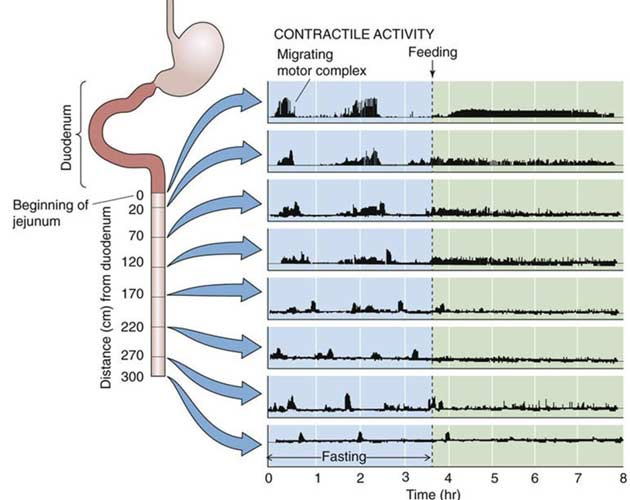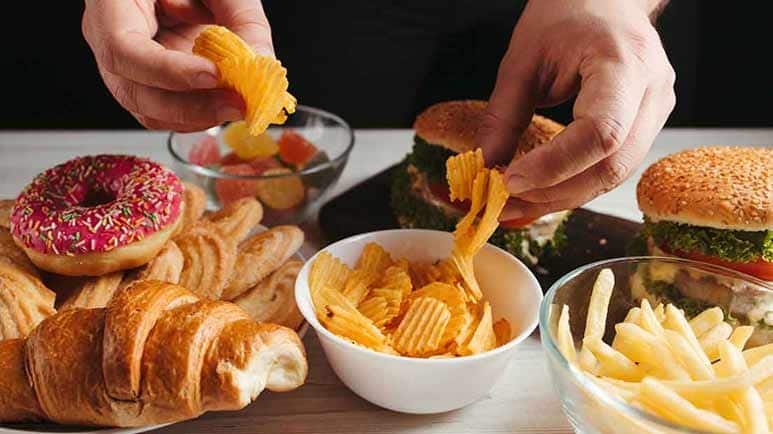The Pitfalls of Constant Snacking: Understanding the Migrating Motor Complex
In today's fast-paced world, snacking has become a common habit.
By: Ashley Armstrong
STORY AT-A-GLANCE
The Migrating Motor Complex (MMC) is a crucial digestive process that cleans the gut between meals, typically occurring every 1.5 to 3 hours when not eating. Constant snacking disrupts the MMC cycle, potentially leading to incomplete digestive cleaning, bacterial overgrowth, and reduced enzyme and bile secretion
Frequent snacking often indicates that main meals are not providing sufficient nourishment, which can lead to a cycle of undereating and binge eating
To support optimal MMC function, space meals 3 to 5 hours apart and focus on larger, more substantial meals with balanced macronutrients
While constant snacking is problematic, extreme fasting is not the solution, as it can lower metabolic rate and negatively impact digestive health in the long term
Balanced eating habits, stress management, and supporting overall metabolic health are key to maintaining optimal digestive function and avoiding the pitfalls of both constant snacking and extreme fasting
In today's fast-paced world, snacking has become a common habit for many. While it might seem like a harmless way to keep hunger at bay, constant snacking can have detrimental effects on our digestive system, particularly on a crucial process known as the Migrating Motor Complex (MMC). So, in this article, let’s explore why snacking all the time isn't the best idea, how it disrupts our natural digestive rhythms, and what it might indicate about our overall eating habits.
Understanding the Migrating Motor Complex
Before delving into the problems with constant snacking, it's essential to understand the Migrating Motor Complex (MMC) and its vital role in our digestive health.
The MMC is a series of muscle contractions that occur in our gut during fasting periods between meals. First described in 1968 by Dr. Szurszewski,1 the MMC serves as an "interdigestive housekeeper" for the small intestine.

The primary function of the MMC is to clean up the digestive tract after we've finished processing a meal. Just as we clean the kitchen after cooking, our body needs to "clean up shop" before the next meal. This process is crucial for maintaining a healthy digestive environment. Key functions of the MMC include:
Bacterial management — It helps transport bacteria from the small intestine to the large intestine, preventing bacterial overgrowth in the small intestine.
Debris removal — The MMC moves food particles and debris through the bowel, ensuring that undigested matter doesn't accumulate.
Enzyme and bile secretion — When the MMC is active, there's an increase in enzyme and bile secretions, which aids in digesting any leftover matter.
Prevention of bacterial backflow — The MMC helps prevent the migration of bacteria from the large intestine back into the small intestine, which could lead to conditions like Small Intestinal Bacterial Overgrowth (SIBO).

The Problem with Constant Snacking
The MMC operates in a cyclic pattern throughout the day, typically occurring every 1.5 to 3 hours for most people when they're not eating. However, this cycle is disrupted every time we eat. So, when we snack constantly, we're repeatedly interrupting the MMC before it can complete its cleaning cycle. This interruption can lead to several issues:
Incomplete digestive cleaning — Without sufficient time between meals, the MMC can't effectively clear out undigested food particles and bacteria from the small intestine.
Bacterial overgrowth — Constant food intake can create an environment where bacteria in the small intestine have a continual food source, potentially leading to overgrowth.
Reduced enzyme and bile secretion — The increase in digestive secretions associated with the MMC may not occur as frequently, potentially impacting overall digestive efficiency.

Snacking as a Sign of Inadequate Meals
Beyond its impact on the MMC, constant snacking often indicates that our main meals aren't nourishing us and providing enough energy. This can happen for several reasons:
Insufficient caloric intake — If meals are too small or low in calories, you may feel the need to snack shortly after eating.
Imbalanced macronutrients — Meals that are low in protein, healthy fats, or carbohydrates may not keep you satisfied for long.
Undereating at meals can set off a problematic chain reaction in our eating habits, often culminating in binge eating later in the day. When we don't consume enough calories or nutrients during our main meals, our body's energy reserves become depleted. This depletion triggers intense hunger signals, often accompanied by cravings for high-calorie, easily accessible foods.
As the day progresses, willpower tends to diminish, making it increasingly difficult to resist these powerful hunger cues.
The result is often a binge episode, where an individual consumes a large amount of food in a short period, often feeling out of control. This binge eating not only disrupts the MMC but can also lead to feelings of guilt and shame, potentially perpetuating a cycle of restrictive eating followed by bingeing.
Moreover, these large, unplanned eating episodes can cause digestive discomfort and further disrupt our body's natural hunger and fullness cues. To avoid this scenario, it's crucial to consume balanced, satisfying meals that provide adequate energy and nutrients, allowing our body to maintain stable blood sugar levels and avoid the extreme hunger that can trigger binge eating.
Eat Set, Bigger Meals, Less Constant Snacking
To support optimal MMC function and overall digestive health, it's recommended to:
Space out meals — Try to leave 3 to 5 hours between meals or snacks. This gives the MMC uninterrupted time to operate.
Eat larger, set meals — Rather than constant snacking, focus on eating larger, more substantial meals that provide enough energy and nutrients to keep you satisfied until the next meal.
Include a balance of macronutrients — Ensure your meals contain an adequate balance of proteins, some healthy fats, and carbohydrates to promote satiety and stable blood sugar levels.
Why Fasting Isn't the Answer
While we've discussed the importance of spacing out meals and avoiding constant snacking, it's equally important to understand that extreme fasting is not the solution to digestive problems. Some people, upon learning about the MMC and the importance of giving the digestive system a break, might be tempted to extend their fasting periods significantly. However, this approach can lead to its own set of problems.
Fasting has gained popularity in recent years as a potential solution for various health issues, including digestive problems. However, it's crucial to understand that:
Fasting is not a magical cure — While fasting may provide short-term relief from digestive discomfort (since you're not actively digesting food), it does not address underlying issues or "fix" your digestive problems.
Short-term relief vs long-term consequences — Fasting might give you temporary relief since you're no longer digesting food, but this relief is often short-lived and doesn't address the root causes of digestive issues.
The Impact of Fasting on Metabolism
One of the most significant issues with extended fasting is its impact on metabolism. It is well documented in scientific literature that fasting can lower metabolic rate. When you don't provide your body with food for extended periods, it interprets this as a signal that starvation may be imminent. As a result, your body lowers its metabolic rate to conserve energy.2 3
While fasting might seem beneficial in the short term, the long-term consequences of a lowered metabolic rate can be detrimental to overall health, including digestive function. Contrary to what some might believe, extended fasting can have negative impacts on digestive health in the long run:
Downregulation of digestive machinery — With a lower metabolic rate, the body down-regulates various physiological processes, including digestive functions. This can lead to poorer gut health in the long run.
Decreased gut motility — Lower metabolic rate often leads to decreased gut motility. As we've discussed earlier, slower motility can lead to a host of digestive issues, including bacterial overgrowth and constipation.
Development of food intolerances — It's common for people who engage in extended fasting to develop more food intolerances over time. This is counterproductive, as being able to tolerate a wide variety of foods is actually a sign of good gut health and a robust metabolism.
Instead of resorting to extreme fasting, the focus should be on eating regular, balanced meals that provide all necessary nutrients is key to maintaining a healthy metabolism and supporting digestive function.
The Relationship Between Metabolism and Digestive Health
Maintaining a healthy metabolism is crucial for optimal digestive function, including the proper operation of the MMC. When metabolic rate decreases, it can lead to a cascade of digestive issues such as slowed gut motility,4 5 increased risk of small intestinal bacterial overgrowth (SIBO), and constipation.6
In one study comparing hypothyroid patients (meaning lowered metabolic rate) to a healthy patient,7 the esophageal emptying for the healthy patient was 90.13%, while the hypothyroid patient only had 57.83% emptying. We want near complete emptying!
For esophageal transit time, the healthy patient was at 21.5seconds, while the hypothyroid patient took nearly double the time to empty at 50.5 seconds (again, not what we want). And the biggest difference was the gastric emptying half-time (which refers to the time it takes for half of the contents of the stomach to be emptied).
The healthy patient was at 28.43 minutes, while the hypothyroid patient was at 79.48 minutes. "Hypothyroidism affects the entire gastrointestinal system and causes hypomotility."8
Conclusion: Finding Balance in Eating Habits
Understanding the complexities of digestion, including the role of the Migrating Motor Complex, helps us appreciate the need for balance in our eating habits. Neither constant snacking nor extreme fasting is the answer to digestive health. Instead, the key lies in:
Eating set, substantial meals — Focus on balanced, satisfying meals that provide enough energy and nutrients.
Allowing appropriate time between meals — Give your digestive system the opportunity to complete its cleaning cycle by spacing out your meals, typically by 3 to 5 hours.
Avoiding extreme approaches — Remember that both constant snacking and extended fasting can disrupt your digestive processes and metabolism.
Supporting overall metabolic health — Through balanced nutrition, regular physical activity, and adequate sleep.
Practice stress management, as stress can have a significant impact on both our digestive function and our eating habits. Acute psychological stress has been shown to suppress MMC motility in healthy subjects.9
By adopting these balanced practices, we can support our body's natural digestive processes, maintain a healthy metabolism, and work towards optimal digestive and overall health. Remember, the goal is not perfection, but rather a sustainable approach that respects our body's natural rhythms and needs.
Transform Your Health — One Step at a Time
Ashley and her sister Sarah have put together a truly groundbreaking step-by-step course called “Rooted in Resilience.” They have compiled what clearly is the best application of Dr. Ray Peat’s work on Bioenergetic Medicine that I have ever seen.
It is so good that I am using the core of their program to teach the many Health Coaches that I am in the process of training for the new Mercola Health Clinics I am opening this fall. It took these women working nearly full-time on this project for a year to create it.
This has to be one of the absolute best values for health education I have ever seen. If you want to understand why you struggle with health problems and then have a clear program on how to reverse those challenges, then this is the course for you.
It is precisely the type of program I wish I would have had access to when I got out of medical school. I fumbled around for decades before I reached the conclusion they discuss in the course and share with you so you can restore your cellular energy production and recover your health.
Select and eat the right foods to heal your metabolism and improve glucose utilization
Balance your hormones to help reduce anxiety, weight gain and sleep disturbances
Use reverse dieting to increase your calories without gaining weight and tanking your metabolism, all while improving your energy levels
Heal your gut for proper immune function, mood and weight management
Tweak your diet and lifestyle habits to improve your mindset and mental health
Crush your fitness goals with ease and get your life back on track
Master the most essential habits for health with bonus guides, including over 100 meal plans to take the stress out of meal time planning and shopping, and so much more!
Learn more about Rooted in Resilience here.
About the Author
Ashley Armstrong is the co-founder of Angel Acres Egg Co., which specializes in low-PUFA (polyunsaturated fat) eggs that are shipped to all 50 states (join waitlist here), and Nourish Cooperative, which ships low-PUFA pork, beef, cheese, A2 dairy and traditional sourdough to all 50 states. Waitlists will reopen shortly.
Disclaimer: The entire contents of this website are based upon the opinions of Dr. Mercola, unless otherwise noted. Individual articles are based upon the opinions of the respective author, who retains copyright as marked.
The information on this website is not intended to replace a one-on-one relationship with a qualified health care professional and is not intended as medical advice. It is intended as a sharing of knowledge and information from the research and experience of Dr. Mercola and his community. Dr. Mercola encourages you to make your own health care decisions based upon your research and in partnership with a qualified health care professional. The subscription fee being requested is for access to the articles and information posted on this site, and is not being paid for any individual medical advice.
If you are pregnant, nursing, taking medication, or have a medical condition, consult your health care professional before using products based on this content.







Excellent insight and information, as always! Thanks for ALL that you do to help empower and SAVE the masses.